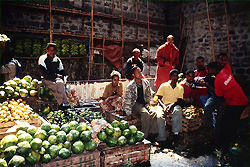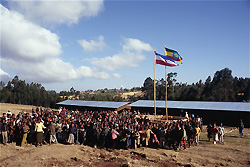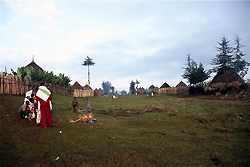(3) The present research was conducted from September 3, 2004 to January 30, 2005 in Addis Ababa and the Southern Region in Ethiopia. I conducted detailed interviews with some founding members of the GRCO, discovering that they shared the aim of "modernizing" their villages against the oppression of the aristocracy that dominated the peoples of Southern Ethiopia in the 1960s, although the organization was founded on the pretext of apolitical development activities. In recent years, however, the organization has lost its cohesiveness, and clan-based subcommittees are conducting development activities in a quasi-independent manner. This may be because the local administration is trying to suppress their activities out of fear that the organization will act as a political enemy. |



 21st Century COE Program
-Aiming for COE of Integrated Area Studies-
21st Century COE Program
-Aiming for COE of Integrated Area Studies-